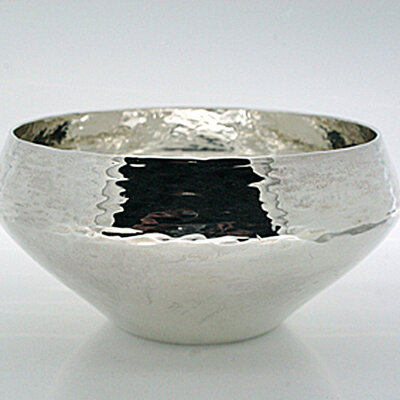This course aims to introduce you to metal forming by raising, forging and scoring hollow work, flatware or boxes. Those with more experience have the opportunity to develop these skills further.
You will learn a range of techniques through demonstration and individual tuition. This course is primarily focused on: hammer work, forming over a pre-shaped former, scored and formed, assembly of pre-formed sides, press forming, chasing and repoussé. Estimating of materials, the properties of metals, use of necessary tools, use of the gas torch for annealing and soldering and procedures for metal finishing will also be covered.
Beginners should be able to accomplish a simple hinged box, bowl or spoon. Advanced students will be able to develop their skills further.
The materials available to work with are: silver, gilding metal and copper.
Please email the tutor in advance of the course via: [email protected] to discuss the project you would like to do on the course.
Arrival Day - this is the first date listed above
Courses start early evening. Residential students to arrive from 4pm, non-residential students to arrive by 6.45pm.
6.45pm: Welcome, followed by dinner (included).
8 - 9pm: First teaching session, attendance is essential.
Daily timetable
Classes 9.15 - 5pm, lunch is included.
From 6.30pm: Dinner (included for residential students).
Evening working - students may have access to workshops until 9pm, but only with their tutor's permission and provided any health and safety guidelines are observed.
Last day
Classes 9.15am - 3pm, lunch is included.
Residential students are to vacate their rooms by 10am please.
(This timetable is for courses of more than one day in length. The tutor may make slight variations)
Included
- Some saw blades, shared by the group
What students need to bring
- Please email the tutor in advance of the course via: [email protected] to discuss the project you would like to do on the course.
- You will need to purchase silver or copper to complete your project; this can be purchased from the College Shop, or in advance from a supplier.
- Sketchbook with a range of possible ideas
- 8" 2nd cut pillar file (may be borrowed from the College)
- 8" 2nd cut ½ round (may be borrowed from the College)
- An apron, hair tie (if needed) and stout covered shoes
Available to buy
- Available from shop:
- Silver can be purchased from the College Shop, which stocks a range of sheet, wire, rod, tube and findings. These will be available in set sizes and lengths, suitable for a wide range of projects.
- A 120mm bowl will cost approximately £110 in 1mm Britannia Silver sheet.
Additional information
Recommended bullion suppliers:
Argex Ltd, Metalor Ltd, Cookson Precious Metals, Michael Bloomstein. Please note: some bullion suppliers have minimum order levels (e.g. £25). Please ask for your requirements to be checked against this before placing an order.
Please wear appropriate clothing/aprons for the workshop or studio. This includes stout covered footwear, i.e. no open-toes or sandals. Please tie hair back, if long.




